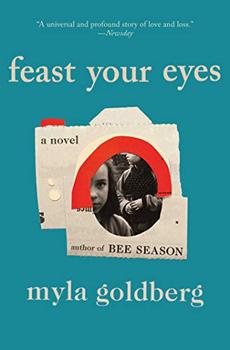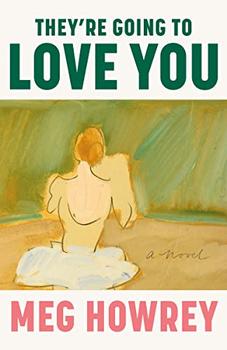Summary | Excerpt | Reading Guide | Reviews | Beyond the book | Read-Alikes | Genres & Themes | Author Bio

Myla Goldberg's latest novel, Feast Your Eyes, is ostensibly about the works of fictional photographer Lillian Preston. As the plot progresses, however, it becomes clear it's about so much more, exploring the challenges of being an artist and a mother from the mid-1950s to mid-1970s, an era that saw the shifting of societal norms and illustrating the risks one may have to take to pursue individual and artistic freedom.
The book is laid out in the form of a catalogue created for a posthumous showing of 118 of Preston's best pictures at New York's Museum of Modern Art (MoMA), with the description of each piece written by her daughter Samantha and supplemented by sections from Lillian's journal and interviews with her friends. Readers discover early on that her work was controversial; one photo in particular, titled "Mommy Is Sick", shows Lillian in bed, bleeding after having had an abortion (illegal at the time), with a semi-nude six-year-old Samantha offering her a glass of milk. The picture – along with six others that were named "The Samantha Series" - sparked outrage, arrest, and a brutal court case, changing Lillian's and Samantha's lives forever. Events became so painful for Samantha that she dropped her given name, choosing to be known by her middle name (Jane) so she could divorce herself from the eponymous photograph series. Her relationship with her mother was also damaged nearly beyond repair, and it's not until Lillian's early death from leukemia and Samantha reviewing her mother's boxes of photographs that she begins to understand how remarkable Lillian truly was.
Goldberg's writing captures her subject beautifully from start to finish. When the adult Samantha comes across the famous picture, it stirs up vivid memories from the day it was taken:
I remembered the dead feeling in my stomach that morning, when I realized my mother was too weak to take the glass of milk from my hand. I remembered sitting on the edge of the bed and holding the milk below her mouth. All she had to do was reach up a little with her hand to hold the glass but even then, the milk dribbled from her mouth and onto her chest. This made the deadness in my stomach fill my whole body, so big and deep and dark that for a while I couldn't breathe.
One of the more fascinating aspects about the novel is that in spite of the fact that the "catalogue" references 118 photographs, there are none in the book. Each is described fully, but it's left to the reader to visualize them.
I found the format in which the book is presented both brilliant and problematic. I love the imagination it required to write such a masterwork; Goldberg's ability to reveal her subjects through the catalogue entries is astonishing. It reminded me of a photo being developed, where the full picture becomes clear only gradually. The book is, itself, a work of art. The flip-side of the layout is that it makes the story somewhat disjointed and repetitive as scenes and memories overlap, and as a result I initially found it a slow read. I was a good 100 page in before it started to demand my attention. It was definitely worth the persistence, though. It's by far one of the most stylistically interesting novels I've read this year, and by the book's end it had become one of my all-time favorites.
Feast Your Eyes will undoubtably win Goldberg many well-deserved accolades; her gorgeous writing, compelling subject, and ingenious format make the novel a true stand-out. It will appeal to those who enjoy literary, character-driven novels, and would also make a wonderful book group selection.
![]() This review was originally published in The BookBrowse Review in May 2019, and has been updated for the
March 2020 edition.
Click here to go to this issue.
This review was originally published in The BookBrowse Review in May 2019, and has been updated for the
March 2020 edition.
Click here to go to this issue.

If you liked Feast Your Eyes, try these:

by R O. Kwon
Published 2025
From bestselling author R. O. Kwon, an exhilarating, blazing-hot novel about a woman caught between her desires and her life.

by Meg Howrey
Published 2023
A magnetic tale of betrayal, art, and ambition, set in the world of professional ballet, New York City during the AIDS crisis, and present-day Los Angeles.
The longest journey of any person is the journey inward
Click Here to find out who said this, as well as discovering other famous literary quotes!
Your guide toexceptional books
BookBrowse seeks out and recommends the best in contemporary fiction and nonfiction—books that not only engage and entertain but also deepen our understanding of ourselves and the world around us.